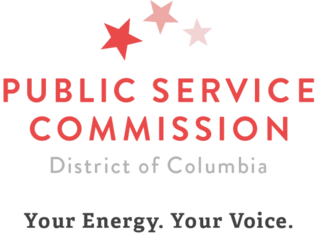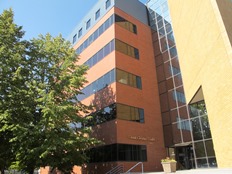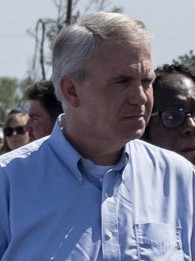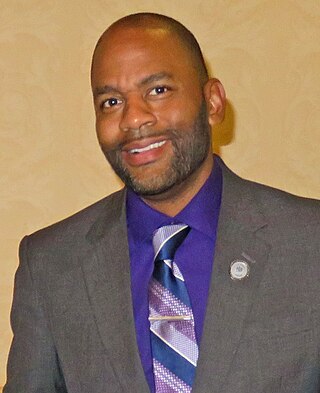A public utilities commission is a quasi-governmental body that provides oversight and/or regulation of public utilities in a particular area, especially in the United States and Canada.
The Minnesota Public Utilities Commission (MPUC) is an independent regulatory agency within the U.S. state of Minnesota responsible for the oversight and regulation of public utilities, including electric, natural gas, and telecommunications services. Created by the Minnesota Legislature, the commission's primary mission is to ensure that residents of Minnesota have access to safe, adequate, and efficient utility services at fair, reasonable rates. It plays a significant role in balancing the needs of consumers, the environment, and utility companies.

The Louisiana Public Service Commission (LPSC) is an independent regulatory agency which manages public utilities and motor carriers in Louisiana. The Commission was created by Article IV, Section 21 of the 1921 Constitution of the State of Louisiana. It succeeded the Railroad Commission of Louisiana that was created by the 1898 Constitution. The commission has five elected members chosen in single-member districts for staggered six-year terms. Thus the commissioners have large constituencies, long terms, and close involvement with issues of intense consumer interest ; consequently membership in LPSC has been known to serve as a springboard to even higher public office, as in the cases of Huey Long, Jimmie Davis, John McKeithen, and Kathleen Babineaux Blanco — LPSC members who became governors of Louisiana.

The California Public Utilities Commission is a regulatory agency that regulates privately owned public utilities in the state of California, including electric power, telecommunications, natural gas and water companies. In addition, the CPUC regulates common carriers, including household goods movers, limousines, rideshare services, self-driving cars, and rail crossing safety. The CPUC has headquarters in the Civic Center district of San Francisco, and field offices in Los Angeles and Sacramento.
The Public Utilities Commission of Ohio (PUCO) is the public utilities commission of the U.S. state of Ohio, charged with the regulation of utility service providers such as those of electricity, natural gas, and telecommunications as well as railroad safety and intrastate hazardous materials transport.

The District of Columbia Public Service Commission is an independent quasi-judicial body and regulatory agency responsible for regulating landline telephone, electricity, and gas utility companies operating within the District of Columbia. It was established by the US Congress in 1913.

The Oklahoma Corporation Commission is the public utilities commission of the U.S state of Oklahoma run by three statewide elected commissioners. Authorized to employ more than 400 employees, it regulates oil and gas drilling, utilities and telephone companies.
The Florida Public Service Commission (FPSC) regulates investor-owned electric, natural gas, and water and wastewater utilities. The FPSC facilitates competitive markets in the telecommunications industry, has authority over intercarrier disputes, and oversees pay telephones, the federal Lifeline Assistance Program and Telecommunications Relay Service.

The Oregon Public Utility Commission (PUC) is the chief electric, gas and telephone utility regulatory agency of the government of the U.S. state of Oregon. It sets rates and establishes rules of operation for the state's investor-owned utility companies. With respect to publicly owned utility districts and cooperatives, its authority is limited to safety regulations.
The Maryland Public Service Commission (PSC) is an independent administrative agency within the state government which regulates public utilities and certain taxi cab and other passenger services in Maryland. Similar to other state public utilities commissions, the Maryland PSC regulates and sets tariff rates for natural gas, electricity distribution, local telephone, water, and sewage disposal companies. The PSC also sets the tariff rates for pilot services for vessels and privately owned toll bridges, approves the construction of electric generating plants and overhead transmission lines with a voltage above 69 kV, and licenses retail natural gas and electricity suppliers. The PSC offices are located in Baltimore in the William Donald Schaefer Building.

The Mississippi secretary of state is an officer of Mississippi originally established under the Article IV, §14 of Mississippi Constitution of 1817, and was reestablished under Article V, §133 of the Mississippi Constitution of 1890.
The National Association of Regulatory Utility Commissioners (NARUC) is the national association representing the U.S. state public service commissioners who regulate essential utility services, including energy, telecommunications, and water. Founded in 1889, the Association is a resource for its members and the regulatory community, providing a venue to set and influence public policy, share best practices, and foster solutions to improve regulation.
The Georgia Public Service Commission (PSC) is a statutory organ of the state government of Georgia; elected among five commission districts, the board consists of a Chairman, a Vice-chairman, and three Commissioners. PSC regulates telecommunications, transportation, electric and natural gas services in the U.S. state of Georgia. Commissioners are elected in partisan elections statewide, though they must reside in a district.
The Montana Public Service Commission (PSC) is a quasi-judicial regulatory board of elected officials in the U.S. state of Montana.
The Public Utilities Commission of Nevada supervises and regulates the operation and maintenance of utility services in Nevada. The agency has two headquarters, one in Carson City and one in Las Vegas.
The Public Service Commission of Wisconsin is an independent regulatory agency responsible for regulating public utilities in the energy, telecommunications, gas and water companies located in U.S. state of Wisconsin. As of 2021, the agency regulated more than 1,100 electric, natural gas, telephone, water, and water/sewer utilities.
The North Carolina Utilities Commission is a government agency that regulates the various utilities of the state of North Carolina. The Commission also regulates household goods transportation, buses, brokers and ferryboats.

Brandon Everitt Presley is an American politician who served as a member of the Mississippi Public Service Commission from the Northern District from 2008 to 2024 and mayor of Nettleton, Mississippi, from 2001 to 2007. He is a member of the Democratic Party.

A general election was held in the U.S. state of Mississippi on November 3, 2015. All of Mississippi's executive officers were up for election. Primary elections were held on August 4, 2015, with primary runoffs to be held on August 25, 2015 if no candidate received a majority in the primary. The filing deadline for primary ballot access was February 27.

De'Keither Stamps is an American politician serving as a member of the Mississippi Public Service Commission. He previously served in the Mississippi House of Representatives from the 66th district as a Democrat from 2020 to 2024. He ran for the 2023 election to the Mississippi Public Service Commission for the Central District, defeating Republican incumbent Brent Bailey in a rematch of their 2019 race. He assumed office in 2024.











